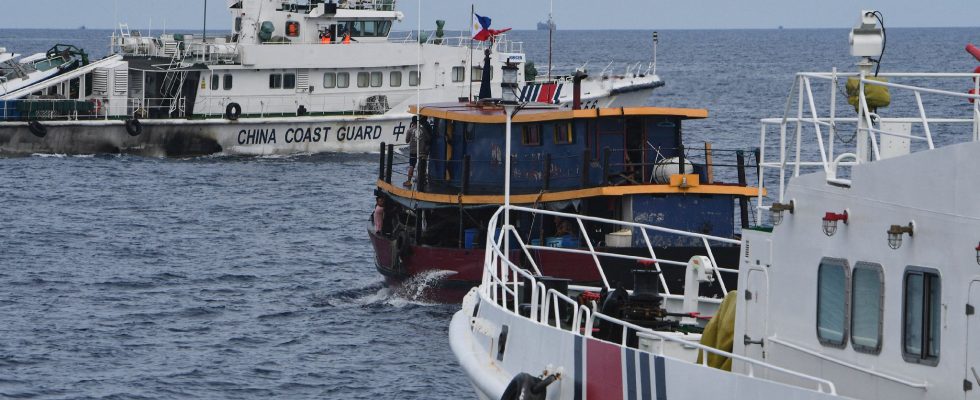Tension rises between the Philippines and China. The two countries continued on Monday October 23 to blame each other for collisions between their country’s ships near a disputed South China Sea atoll through the summoning of the Chinese ambassador by Manila and a “solemn” protest issued through Beijing.
“We are making full use of diplomatic procedures […] at our disposal. This includes summoning the Chinese ambassador, which we did this morning” on Monday, Philippine Foreign Ministry spokesperson Teresita Daza told reporters. These Chinese ships “intentionally” collided with boats Filipinos, the Philippine government accused on Monday.
“Sovereign rights”
Chinese Ambassador Huang Xilian was unavailable and was represented by his deputy head of mission at the meeting at the Ministry of Foreign Affairs. “Ayungin Shoal is part of our exclusive economic zone and continental shelf, and we have sovereign rights and jurisdiction over it,” added Teresita Daza, using the Filipino name of the atoll located in the Spratlys and also called Second Thomas Shoal.
Beijing, for its part, sent a “solemn” protest through diplomatic channels to the Philippines, expressing its “strong dissatisfaction” and its “firm opposition” after the “intrusion” of Philippine ships around the disputed atoll, the Chinese embassy in Manila said Monday. Manila and Beijing blame each other for two collisions that occurred on Sunday near the atoll, where the Philippine navy is stationed and where Beijing deploys ships to assert its territorial claims.
Beijing claims almost the entire South China Sea despite rival claims from the Philippines, Vietnam and Malaysia, ignoring a 2016 international judgment against it. Huang Xilian was last summoned by Manila in August after the Chinese coast guard used a water cannon on Philippine ships near the same atoll.
A resupply mission
The collisions came as the Philippines was conducting a routine resupply mission for its troops at the isolated outpost about 200 km from the Philippine island of Palawan and more than 1,000 km from China’s largest island. near, Hainan.
In 1999, the Philippines deliberately ran a military boat, the BRP Sierra Madre, aground on the atoll with the aim of installing troops there and asserting its claims to sovereignty against China.
The ship has since been a source of tension between Beijing and Manila. The Philippine Marines on board depend on resupply missions to survive. On Sunday, “the dangerous blocking maneuvers of the Chinese coast guard vessel 5203 caused it to collide with the supply boat […] under contract with the Armed Forces of the Philippines” some 25 km from the coral island, blasted a Philippine government intervention force.
China cited a “slight collision” after the Philippine boat ignored “multiple warnings and deliberately crossed law enforcement in an unprofessional and dangerous manner”, according to public television CCTV, citing the Ministry of Foreign Affairs. In another incident, a Philippine Coast Guard vessel escorting the resupply mission was “struck” by what Manila called a “Chinese maritime militia vessel.”
Beijing accuses the Philippines
Beijing, however, accused the Philippine boat of having “deliberately” caused a collision by backing up in a “premeditated” manner towards a Chinese fishing vessel.
Video released by the Philippine military shows the bow of the Chinese coast guard ship and the stern of the Manila supply ship briefly touching. Then the Philippine ship continued on its way without it being possible to determine whether there had been any damage. For Beijing, “the responsibility for Sunday’s incidents lies entirely with the Philippines.”
Washington, Manila’s military ally and former colonial power, gave it its “support” and denounced in a statement from the State Department “the dangerous actions” and “violation of international law” of the coast guard and the “militia maritime” of China.
